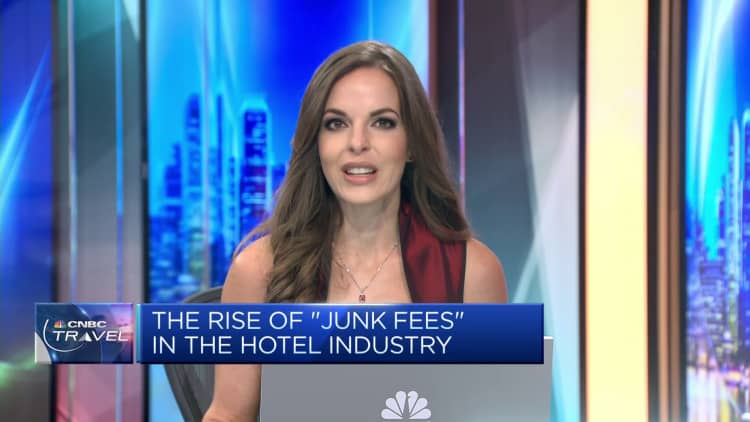
[ad_1]
My hotel bill from a three-night trip to New York City included 21 charges.
Nine were for “destination fees.”
There were three daily fees of nearly $35 each — notwithstanding that my third night was supposed to be “free”— plus separate sales and occupancy taxes on each fee.
And that was just for one of our rooms — we booked two. All in, the fees were $240.
‘Junk fees’ in the hotel industry
I’d read about “junk fees” in the hotel industry — how they’re often couched in such terms as “resort,” “destination” or even “hospitality service” fees, that they’re on the rise (especially in North America) and that they even got a mention in President Joe Biden’s State of the Union Address this year.
But I’d also read that hotel staff will waive them, when pressed. I, however, had no such luck at the end of my stay at Thompson Central Park New York, a Hyatt hotel. The front desk staff insisted the fees be paid.

In a written response to CNBC, Munir Salem, the manager of Thompson Central Park said: “Like many hotels in the area, Thompson Central Park includes a daily destination fee to provide guests with amenities, activities, and other benefits that we believe guests will enjoy.”
What I got for the fee
The hotel’s website says its “destination fees” provide amenities like:
- Premium internet access
- Access to a fitness center
- Concierge business services
- Newspapers on request
- One bottle of water per guest at check-in
Those are all things I presumed would come with my booking, especially since entry-level rates regularly exceed $500 per night.
There’s more. The fees also provide discounts: a free hour on a bike rental (with one paid hour), 6% off The New York Pass for sightseeing, 8% off a hop-on hop-off bus tour, and “exclusive access to 20% off” zoo tickets — all fine things, but nothing I wanted or would use.
‘No way to opt out’
In the competitive luxury hospitality industry — where operators strive for flawless stays and glowing online reviews — hotels with fees run the risk of leaving guests feeling hoodwinked right before they walk out the door.
But the reason isn’t surprising.
“It’s very lucrative,” Rafat Ali, the CEO and founder of the travel media company, Skift, told CNBC. Federal Trade Commission estimates show consumers paid around $2 billion in hotel fees before the pandemic, and mandatory fees have grown since then.
President Joe Biden said in his 2023 State of the Union Address: “We’re going to ban surprise resort fees that hotels charge on your bill. Those fees can cost you up to $90 a night at hotels that aren’t even resorts.”
Kent Nishimura | Los Angeles Times | Getty Images
Ali said hotels are hoping mandatory fees will eventually be normalized, similar to how baggage fees are now an accepted cost when flying. But it’s never going to happen, he said.
“This was the argument that they made all along, which is: If I’m not checking baggage, why should I be paying that as part of the bundle?” he said. “In hotels, that doesn’t work because … you’re not unbundling anything, you’re just adding this on — and there’s no way to opt out.”
On Aug. 1 on Skift’s website, Ali wrote an open letter to the travel industry with one message: “You won’t win this ‘junk fee’ fight.”
The reason, he said, is that even in a partisan world, everyone dislikes these fees.
Legislation and lawsuits
Last March, the Junk Fee Prevention Act was introduced in the U.S. Senate to eliminate “excessive, hidden and unnecessary fees” and require total costs be clearly displayed “when a price is first shown to a consumer.”
In July, a bipartisan bill introduced in the U.S. Senate specifically targeted fees in the hotel industry. The bill, the Hotel Fees Transparency Act, prohibits hotels from advertising rates without mandatory fees.
Former presidential candidate and current Senator Amy Klobuchar, D-Minn., introduced the Hotels Fees Transparency Act to the U.S. Senate in late July.
Bill Clark | Cq-roll Call, Inc. | Getty Images
Ali said, whether the bills pass or not, he believes they put public pressure on companies to act — similar, he added, to how the Biden Administration targeted airlines that charge families to sit together. United, American and Frontier soon changed their policies.
On Aug. 10, the Attorney General of Texas sued Booking Holdings — which operates popular booking sites like Booking.com, Priceline, Agoda and Kayak — for deceptive trade practices, taking aim at companies that advertise one rate and tack on mandatory fees later in the buying process.
The suit addresses this practice, known as drip pricing, calling it an illegal “bait and switch tactic” that leads more consumers to make purchases either because they don’t notice the new fees or because they begrudgingly accept the fees at the final booking page — out of a reluctance to start the process all over again.
Pennsylvania lodged a similar complaint against Marriott International Inc. In April 2023, the hotel chain agreed to pay $225,000 to Pennsylvania for failing to comply with agreed settlement terms, which required that Marriott clearly post room rates and mandatory fees.
The issue of transparency
Thompson Central Park’s Salem told CNBC that its “direct booking channels fully disclose room rates and any fees to guests throughout the booking process.”
I checked that, and indeed the hotel’s website does include the $35 fee in the total cost. Searches on Booking.com and Expedia showed the same. Perhaps I should have expected the fees after all?
But the problem is I didn’t book online; I booked over the phone (my family needs connecting rooms which is an issue unto itself). Additionally, when we checked in, the hotel couldn’t locate our booking, which resulted in our having to negotiate a new booking on the spot. During these discussions, we talked about rates a lot, but destination fees never came up.
A post from a message board on FlyerTalk.com.
In a statement in support of the Hotel Fees Transparency Act, the American Hotel & Lodging Association’s President and CEO Chip Rogers said the bill “will create a single standard for mandatory fee display.” But even with transparent pricing, cases like mine could slip though.
I’m left wondering why hotels don’t simply wrap these fees into the room rate. After all, the same guest who is fine with a $300 nightly rate may balk at paying $250 for a room and $50 for a “hospitality service fee.”
An unsatisfying victory
Several days after our stay, my husband and I — hell-bent on principle at this point — called the hotel to dispute the fees. The representative said he would remove the charges if we were Hyatt loyalty program members. We aren’t.
But because of our check-in fiasco, we were told we were good candidates to get the fees waived.
We hung up and waited — that was nearly two months ago.
After weeks of silence, I finally called my credit card company to dispute the charges, as recommended by articles like this one, written by consumer advocate Christopher Elliott (who received the same puzzling email that I did, touting destination fees of “just $30” at a California hotel that “guests will genuinely love”).
Within minutes, my credit card company removed the charges. An email quickly confirmed this, stating: “Your dispute has been resolved.”
But victory wasn’t the emotion I felt. Don’t get me wrong — I was glad to avoid the fees. But this was never about the money. It’s about the inherent unfairness of being handed a hotel bill composed of multiple charges you didn’t see coming.
[ad_2]
Source link